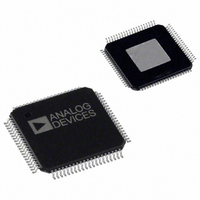AD9775BSVRL Analog Devices Inc, AD9775BSVRL Datasheet - Page 38

AD9775BSVRL
Manufacturer Part Number
AD9775BSVRL
Description
IC DAC 14BIT DUAL 160MSPS 80TQFP
Manufacturer
Analog Devices Inc
Series
TxDAC+®r
Datasheet
1.AD9775BSVZRL.pdf
(56 pages)
Specifications of AD9775BSVRL
Rohs Status
RoHS non-compliant
Settling Time
11ns
Number Of Bits
14
Data Interface
Parallel
Number Of Converters
2
Voltage Supply Source
Analog and Digital
Power Dissipation (max)
410mW
Operating Temperature
-40°C ~ 85°C
Mounting Type
Surface Mount
Package / Case
80-TQFP Exposed Pad, 80-eTQFP, 80-HTQFP, 80-VQFP
For Use With
AD9775-EBZ - BOARD EVALUATION FOR AD9775
IMAGE REJECTION AND SIDEBAND SUPPRESSION
OF MODULATED CARRIERS
As shown in Figure 79, image rejection can be achieved by
applying baseband data to the AD9775 and following the
AD9775 with a quadrature modulator. To process multiple
carriers while still maintaining image reject capability, each
carrier must be complex modulated. As Figure 80 shows, single
or multiple complex modulators can be used to synthesize
complex carriers. These complex carriers are then summed and
applied to the real and imaginary inputs of the AD9775.
A system in which multiple baseband signals are complex
modulated and then applied to the AD9775 real and imaginary
inputs followed by a quadrature modulator is shown in Figure 82,
which also describes the transfer function of this system and the
spectral output. Note the similarity of the transfer functions
given in Figure 82 and Figure 80. Figure 82 adds an additional
complex modulator stage for the purpose of summing multiple
carriers at the AD9775 inputs. Also, as in Figure 79, the image
rejection is not dependent on the real or imaginary baseband
BASEBAND
CHANNELS
IMAGINARY
MULTIPLE
REAL
FREQUENCY = ω
BASEBAND CHANNEL N
BASEBAND CHANNEL 1
BASEBAND CHANNEL 2
MODULATORS
–ω
MULTIPLE
COMPLEX
IMAGINARY INPUT
IMAGINARY INPUT
IMAGINARY INPUT
1
– ω
C
REAL INPUT
REAL INPUT
REAL INPUT
– ω
1
, ω
Q
2
...ω
N
OUTPUT = REAL
COMPLEX BASEBAND
IMAGINARY
MODULATOR N
MODULATOR 1
MODULATOR 2
Figure 82. Image Rejection with Multicarrier Signals
COMPLEX
COMPLEX
COMPLEX
Figure 81. Synthesis of Multicarrier Complex Signal
REAL
SIGNAL
REJECTED IMAGES
DC
Rev. E | Page 38 of 56
R(1)
R(1)
R(2)
R(2)
R(N)
R(N)
FREQUENCY = ω
MODULATOR
×
COMPLEX
AD9775
e
j(ω
R(N) = REAL OUTPUT OF N
I(N) = IMAGINARY OUTPUT OF N
N
+ ω
C
data on any channel. Image rejection on a channel occurs if
either the real or imaginary data, or both, is present on the
baseband channel.
It is important to remember that the magnitude of a complex
signal can be 1.414× the magnitude of its real or imaginary
components. Due to this 3 dB increase in signal amplitude, the
real and imaginary inputs to the AD9775 must be kept at least
3 dB below full scale when operating with the complex modu-
lator. Overranging in the complex modulator results in severe
distortion at the DAC output.
= REAL
C
+ ω
Q
OUTPUT = REAL
)t
COMPLEX BASEBAND
ω
1
MULTICARRIER
REAL OUTPUT =
R(1) + R(2) + . . .R(N)
(TO REAL INPUT OF AD9775)
MULTICARRIER
IMAGINARY OUTPUT =
I(1) + I(2) + . . .I(N)
(TO IMAGINARY INPUT OF AD9775)
IMAGINARY
+ ω
–ω1 – ω2
REAL
C
SIGNAL
+ ω
Figure 80. Two-Stage Complex Upconversion
1/2
Q
FREQUENCY = ω
QUADRATURE
1
MODULATOR
DC
×
e j(ω1 + ω2)t
Q
ω1 + ω2
FREQUENCY
1/2
REAL
AD9775












